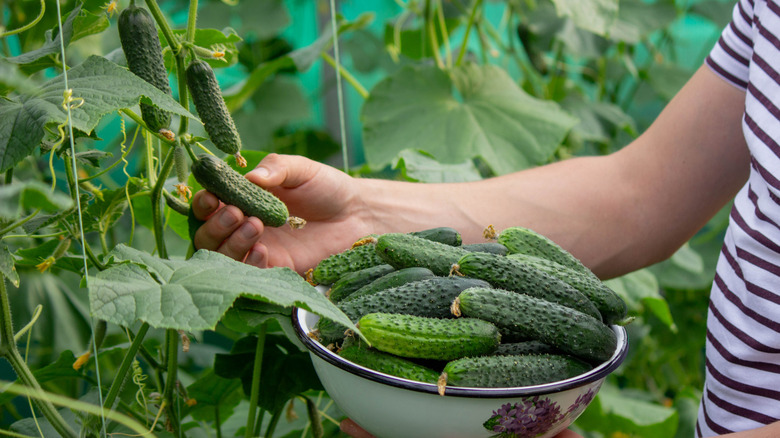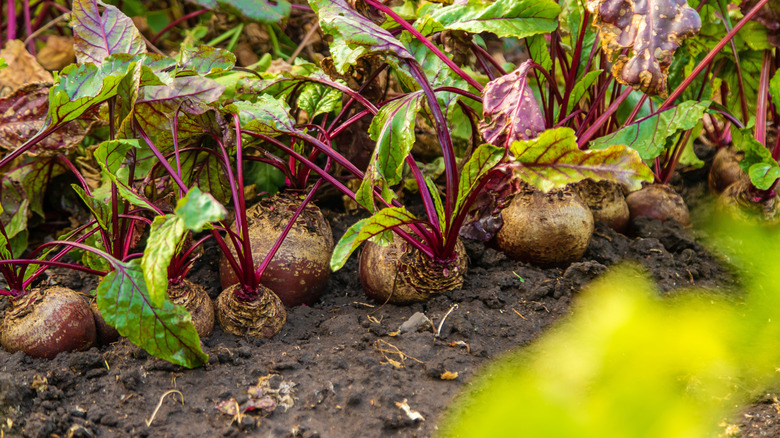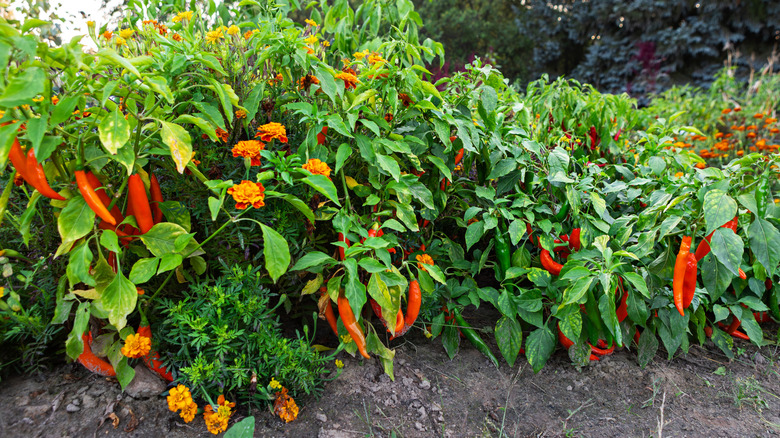The Fast-Growing Veggie You Should Plant With Cucumbers For A Bountiful Harvest
We may receive a commission on purchases made from links.
Cucumbers are a favorite vegetable in many gardens, not just in the United States, but around the world. That shouldn't come as a surprise since the green-skinned veggie is a crunchy and refreshing addition to salads or just as a snack. Cucumbers (Cucumis sativus) are generally easy to grow and will reward you with some edibles for your bowl, but there is a fast-growing veggie you should plant with cucumbers for a bountiful harvest. The companion plant that can make that magic happen is the humble, ordinary beet (Beta vulgaris). Beets also can be harvested quickly, most of them maturing in about two months, give or take a few days, which means the fast-growing root vegetables will be quick to get to work helping out your cucumber plants.
Beets have been around for thousands of years, but may have gotten a bad rap at times. Some people tend to think of them as the jarred, pickled, squishy things that found their way onto 1960s relish trays. Those with a green thumb know better; gardeners who cultivate the root vegetables are aware of the many other ways to enjoy the vegetable. To have it be one of the 10 companion plants you should grow next to cucumbers in your garden is a bonus. Read on for more about the organic friendship between cucumbers and beets.
Growing beets in the shadow of cucumbers
Beets and cucumbers can share gardening space quite easily. Most varieties of cucumber like full sun and medium amounts of water, though the water should be consistent. The same is true for beets, though they're okay with full sun or part shade, which works out perfectly since many cucumber varieties should be trellised for optimum growth. Bush cucumbers don't do as well on a trellis (some gardeners recommend using tomato cages) — but whether trellised or caged, the cukes could shade the growing beets even if you planted the cucumbers in full sun, which is one of the reasons why the two are good companion plants. Another reason is that the root vegetable (beet) isn't vying for the same territory as the one growing above ground (cucumber).
When you're ready to see how beets help cucumbers thrive, sow beets first; they're a tasty, cold-hardy vegetable to plant in your garden in spring. Plant the seeds as soon as the ground is warm enough to work (direct sown into the ground). Read the directions on your seed packet to be sure what you're doing is correct for your area and the types of seeds you have. One to consider trying is the Old Farmer's Almanac Heirloom Beet Seeds (Detroit Dark Red), which is non-GMO and has about 360 seeds. For cucumbers, be sure to check your soil temperature first and not just the calendar date for when you think you should be planting in your growing zone. They don't like cold dirt. The ideal is soil temperature above 65 degrees, which you can check using a battery-powered Tiptop Home Rapitest Dig Thermometer.
Give cucumbers and beets extra plants to befriend
If your garden bed is large enough, you can give some thought to other companion plants that can work perfectly together. Cucumbers and beets are great together, but those beets have much to offer other plants. In fact, it's the companion plant that will thrive next to your peppers in the garden. Beets have leaves that help shade the soil so that it stays a little cooler and doesn't dry out as quickly, which both peppers (Capsicum) and cucumbers appreciate. The subterranean-growing beets also aid in weed prevention by taking up some of the real estate that weeds might otherwise occupy.
As you explore all the ways that various plants work together, before long you may want to get a whole band of happy companions together to help your cucumbers thrive! Along the way you'll probably discover why cucumbers and marigolds are the perfect companions in the garden, and the extra bonus is that those same marigolds (Calendula) are excellent companion plants for both beets and peppers. You may find yourself picking bushels of cucumbers, beets, and peppers this season as a result, and may need extra companions of your own with whom to share the bounty.


